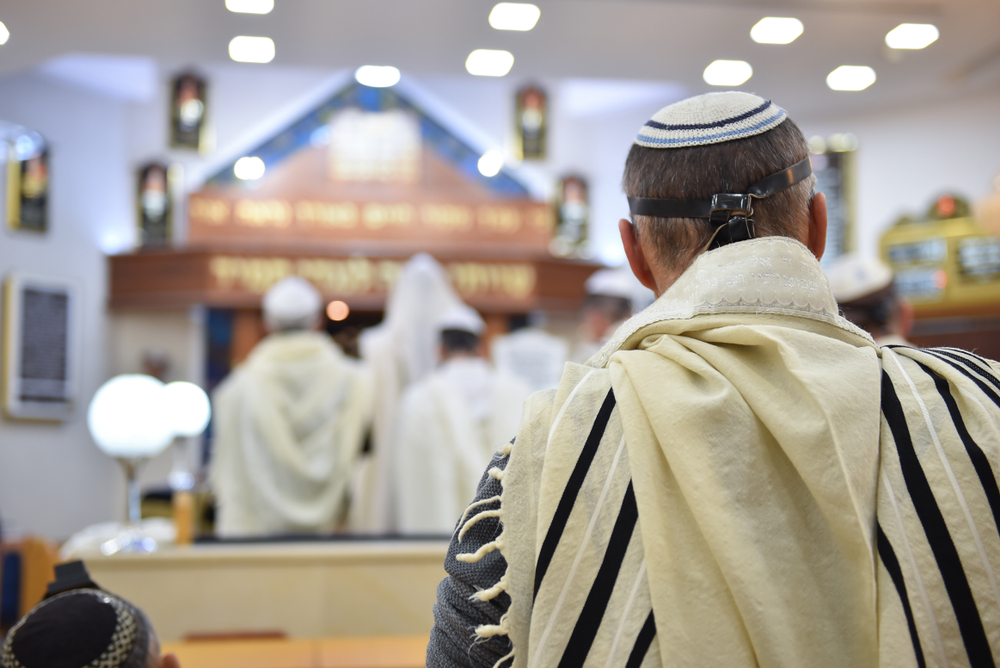Who's in Your Synagogue: The Shechinah or the Angel of Death?
Are your prayers in the synagogue being directed to the wrong place? Could the air you breathe actually be empowering negative forces? Is your synagogue a place of danger? Discover the hidden dangers of talking during prayers.
 (Photo: shutterstock)
(Photo: shutterstock)This happened many years ago, but the shock remains vivid. I was early in my journey of spiritual strengthening, visiting the synagogue sporadically. I wasn't a regular, nor did I have a designated seat. I wandered from one synagogue to another in my area.
It happened on a Friday night. Mincha, Kabbalat Shabbat, a short sermon from the rabbi followed by Ma'ariv. A group of young men arrived during the rabbi's sermon before Ma'ariv started. The whispers were loud and carried well.
They positioned themselves right behind me. Despite my random "shhh!" attempts, which weren't effective, I was too new to make a bigger impact. Other congregants also tried to quiet them, but they continued their chatter, as if it was the time and place for casual conversation.
Then it happened. I wasn't ready for it.
A roar from a fellow congregant, a lion's roar: "Aren't you ashamed of yourselves?! Where do you think you are?!" Silence fell over the synagogue. Stunned and alarmed, I lowered my gaze.
After that, they were quiet.
The synagogue is a sacred place, a "miniature holy space" since the destruction of the Temple. We are obligated to honor it and act with reverence. It's where we meet Hashem, and our behavior should reflect humility, reverence, and submission. Small talk, chuckling, or random chatting is far from observing "And you shall honor my sanctuary."
Why is talking in the synagogue such a serious issue? Rabbi Eliyahu Amar explains:
Angel of Death in the Synagogue?!
The Talmud states that during a plague, there's danger in some synagogues, so one shouldn't enter alone because the Angel of Death deposits his tools there.
"A plague in the city – one should not enter a synagogue alone as the Angel of Death deposits his tools there" (Talmud, Bava Kamma 60b).
The Talmud continues, explaining which synagogues are safe from this danger – those where children learn or where ten people pray. In other words, synagogues that aren't deserted, that are treated with sanctity and respect, are safe.
 (Photo: shutterstock)
(Photo: shutterstock)In times of plague, when the attribute of justice reigns, a synagogue that disrespects its sanctity by talking during prayers becomes a dangerous place, frequented by the Angel of Death's messengers.
The Chatam Sofer explained in one of his sermons regarding the prohibition of talking in the synagogue: In a synagogue where conversation occurs during prayer, it drives away the Shechinah, and instead, impurity takes control. The prince of impurity becomes the owner of the space, receiving prayers and diverting them to places of impurity. Here's his wording: "Hashem, in His vast mercy, left us miniature holy spaces, synagogues, and study houses. If we treat them as sacred, they hold the holiness of the Land of Israel, and the prayers reach the gateways to heaven. But if, G-d forbid, we treat them disrespectfully and engage in idle conversation, this empty chatter is impure, allowing the prince of impurity to become the master of the synagogue, receiving the prayers and directing them to external forces" (Chatam Sofer: Sermons, vol. 2, p. 309).
Creating a Cloud That Blocks Your Prayers
Those who talk in the synagogue during prayer show disrespect for Hashem, desecrate the sacredness of the place, and prevent the prayers of others, who are praying with intent, from being accepted by the Most High. As explained in the book "Avodat Yisrael" by the Maggid of Kozhnitz: "One must be careful not to speak any idle words in the synagogue aside from the prayers, because when one speaks idle words during prayers, it's like speaking to a king but turning away to personal matters first, demonstrating disdain for the Divine Presence, therefore causing the prayers of others, who pray with intention, to not be accepted". Similarly, Rabbi Jonathan Eibeschütz wrote in his "Yaarot Devash": "Those who speak in the synagogue create a cloud that blocks prayers... It not only hinders their own prayers from being accepted but also prevents others’ prayers from being accepted"] (Yaarot Devash, vol. 1, Drush 4).
If the severity of talking during prayers hasn't disturbed you enough, then note this: "Do not speak idle talk... anyone who speaks in the synagogue while the congregation praises Hashem shows that he has no part in the G-d of Israel" (Shulchan Aruch HaRav, Orach Chaim, Siman 124), and the holy Zohar (Parshat Terumah) states: "Those who speak mundane words in the synagogue... woe to them, for they have no part in the G-d of Israel, as they show disrespect for the Divine Presence".
What makes the synagogue so special? Nir Kaptan went to investigate with Rabbi Aharon Mazuz and came back with strengthening answers:
Breathing the Evil Urge
Rabbi Baruch of Kosov, a contemporary of the Baal Shem Tov, writes in his book "Yesod HaEmunah" that those who speak idle words in the synagogue exhale air filled with impurity, which others in the synagogue breathe, strengthening their evil inclinations. Here's his wording: "It is known that the synagogue is a 'miniature sanctuary' because it constantly deals with holy matters, and thus the air of the synagogue is holy. By drawing in this sacred air, one becomes healthy, strong, and lives long... From this, you understand how those speaking idle words in the synagogue harm themselves and others who inhale this air, causing harm to both their bodies and souls, as the evil air is detrimental because it is polluted and impure, thus strengthening the evil inclination".
After all this, I believe it would benefit us all to strengthen ourselves and our fellow congregants in the prohibition of talking during prayers. None of us want to inhale the air of the evil inclination...
The deceased appeared in a dream, delivering a chilling message to be shared with the public. Listen to the true story told by Rabbi Eliyahu Amar, and pass it on to family and friends:

